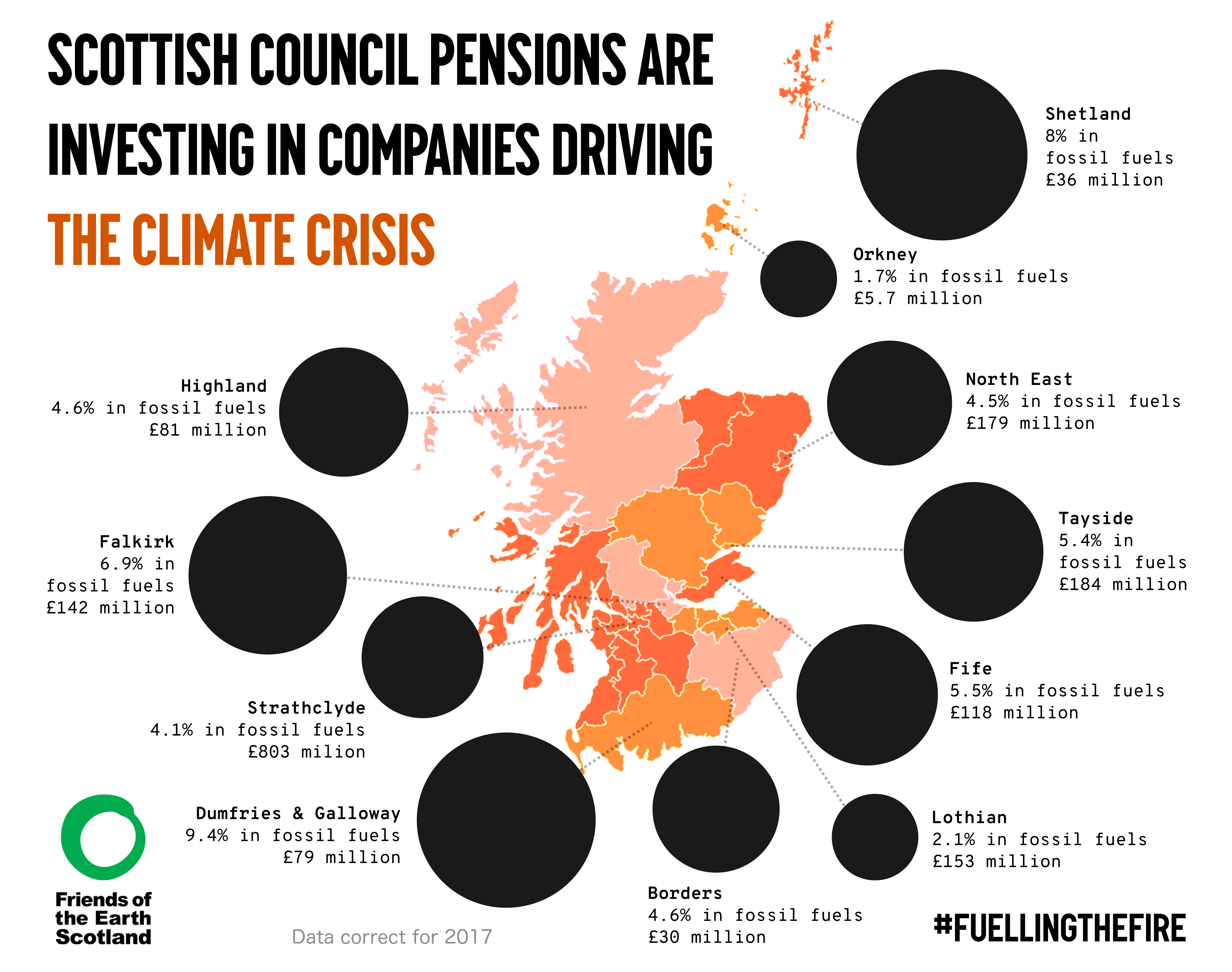
New report shows how council pensions are fuelling the climate crisis

A new report published today shows that Scottish council pension funds invest £1.8 billion in fossil fuels – the industry most responsible for climate change.
The data also show that between 2015-2017 Scottish council investments in fossil fuels have increased by £146 million. During this period nearly all national governments signed up to the Paris Agreement on climate change. The Scottish Government has also taken measures to end the use of fossil fuel cars by 2032 and ban fracking. Investments in fossil fuels fly in the face of Scotland’s wider efforts to phase out fossil fuel cars and ban fracking.
Dumfries and Galloway was the worst offender, investing 9.4% of their entire pension fund in fossil fuels. Strathclyde Pension Fund, Scotland’s largest, invested the largest total in fossil fuels: £803 million.
The total figure represents 4.2% of the scheme’s value: a £3,580 stake in fossil fuels for every member of the local government pension scheme in Scotland.
| Local Authority Pension Fund | Total Fund Value | Fossil Fuel Investment | As pc. |
| Dumfries and Galloway | £834,357,000 | £78,597,700 | 9.42% |
| Falkirk | £2,060,756,342 | £142,185,395 | 6.90% |
| Fife | £2,158,050,750 | £118,451,232 | 5.49% |
| Highland | £1,762,942,027 | £80,934,459 | 4.59% |
| Lothian | £7,420,982,641 | £152,615,424 | 2.06% |
| North East Scotland | £3,999,909,195 | £179,194,146 | 4.48% |
| Orkney Islands | £338,195,640 | £5,719,692 | 1.69% |
| Scottish Borders | £655,220,426 | £30,317,010 | 4.63% |
| Shetland Islands | £449,703,247 | £36,106,629 | 8.03% |
| Strathclyde | £19,658,803,554 | £802,759,409 | 4.08% |
| Tayside | £3,427,706,412 | £183,718,657 | 5.36% |
The report, published jointly by Friends of the Earth in Scotland, England, Wales and Northern Ireland, 350.org and Platform, showed that UK-wide council pension investment in fossil fuels stood at £16.1 billion, a £2.3 billion increase from 2015. UK data can be explored here.
Whilst many pension funds accept the facts of climate change they often insist that engaging directly with these companies is an effective way to tackle the problem. But fossil fuel companies won’t be talked into dropping their core business of digging oil, gas and coal out of the ground. Instead councillors who oversee these funds need to make a credible plan to divest.
We are urging people to contact their Councillors to ask them to support the divestment campaign
The new report is pubished as the 2017 UN Climate Change Conference gets underway. The conference is chaired by Fiji, an island nation where villages have already been forced to move to higher lands. Up to 1.7 million people from Pacific Islands could be displaced by climate change by 2050.

Pacific Climate Warriors visited Europe’s largest coal mine the day before the official start of the UN climate change talks (pictured).
George Guivalu Nacewa, a Pacific Climate Warrior from Fiji said: “In the Pacific, the impacts of climate change are not a debate, it is our reality. We need to keep fossil fuels in the ground. We no longer have time to talk. Now is the time to act.”
Several councils in England have committed to divest from fossil fuels including Southwark, Haringey, Hackney, South Yorkshire and Waltham Forest.
Councillor Simon Miller, the former Chair of Waltham Forest Pension Fund said:
“I am proud that Waltham Forest has committed to divest from fossil fuels. Given current pressures on Local Authority budgets, our pension funds have a key role to play, not only in making our economy greener and our communities healthier, but as driver of sustainable, future focused investment in local areas.”
In Scotland the Universities of Glasgow, Abertay, West of Scotland and Queen Margaret, along with the United Reform Church, have committed to fully divest from fossil fuels. They join over 800 organisations worldwide who have gone fossil free.
- Find out more about our Divestment campaign and email your councillor today.
